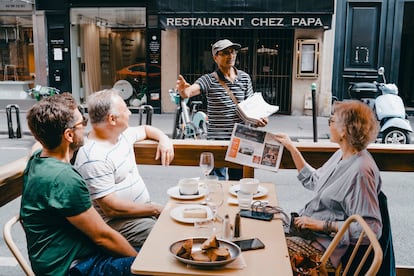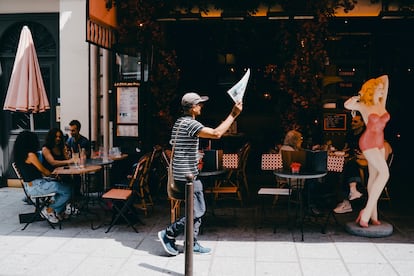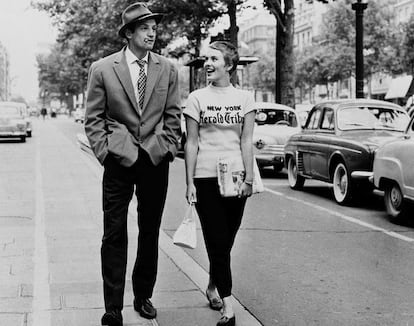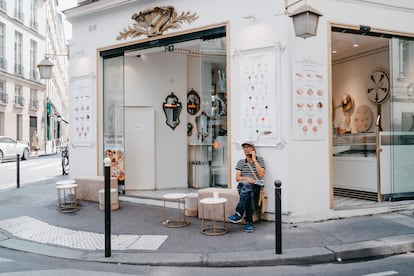Extra, extra! The last newspaper vendor in Paris is still standing!

A short, wiry man wearing a baseball cap and thick brown-framed glasses carefully leans his bicycle against a lamppost next to the Hibou café at the Parisian Odéon. With a gentle gesture, he reaches into a plastic bag and pulls out a small bundle of newspapers, which he tucks under his arm. As if the curtain were about to rise, the man takes a deep breath and exclaims: "Here it is! Bayrou has solved France's problems. We're saved. Buy Le Monde !" The show begins.
Ali Akbar, a 72-year-old Pakistani, is the last street newspaper vendor in Paris, although the French name is much more poetic: crieur (screamer). For more than half a century, he has traveled about 15 kilometers a day through the alleys of the Latin Quarter, selling newspapers in squares, restaurants, and nightclubs. Ali arrives from Antony, in the southern suburbs of Paris, at midday. He starts at 1:00, when Le Monde (his evening edition) arrives at the newsstands, and doesn't leave until the last copy has flown by. Whether it's 8:00, 9:00, or 10:00 at night. From the Café Fleur to Les Éditeurs, via the Lipp brasserie to the Sciences Po faculty , where, for years, when he sold more than 250 newspapers a day, he found his main customers among political science students eager to know what was happening in the world.
Akbar started half a century ago by dispatching the satirical newspaper Charlie Hebdo and Libération . Later, when students started asking her to, she moved to Le Monde, in a city where some 40 crieurs shared the street corners of the main districts, trying not to step on each other's turf. A profession that may have reached its peak in 1960s Paris, when Jean Seberg wound her way through the cars on the Champs-Élysées in Jean-Luc Godard's Breathless , clutching several newspapers under her arm, shouting “ New York Herald Tribune !” while being chased by Jean-Paul Belmondo, frustrated because he couldn't find his horoscope in the paper.

Other times. Especially in the Latin Quarter, then an Apache territory of intellectuals graduating from the École Normale Supérieure, poets, actors, and sleepless nights. Akbar's life is also a kind of thermometer for the city's cultural health, and for the roller coaster ride of the journalism industry. "This place has changed a lot. Before, it was like a village, a neighborhood with a soul. Now there's only money, tourists. Bookstores are now clothing or luxury stores. And my customers, or those who should be, don't read. Or they only read on their mobile phones, digitally," he notes.
Akbar left his native Pakistan by boat, penniless, and crossed half the world before arriving in Paris. He taught himself French, slept on the streets for a long time, and tried a thousand times to find work. “Thanks to an Argentinian, I was able to start selling newspapers on the street,” he recalls. But it was tough. And the memories of the worst moments, of the discrimination, still return. That's why, he confesses, he's still in the same neighborhood after half a century. “I'm very sensitive, and at first it was hard. The streets are tough, and many people treated me like a beggar. Now everyone here knows me, they love me. And if I went to another neighborhood, I'd have to start all over again,” he notes.

Ali is an institution in the neighborhood. Everyone knows him. Many leave him an extra bill with their newspaper or invite him to lunch while they chat for a while. At 5:00 p.m. on Wednesday, after a coffee at Le Hibou, he gets back on his bike and continues his journey, first along Boulevard Saint Germain, then turns to Place Saint Suplice, where he enters the Café de la Mairie. Many have passed through here. Politicians, like Emmanuel Macron (“when I was a student at Sciences-Po, he would buy me a coffee”), Hubert Védrine, Edouard Philippe, and Jean-Louis Debré. Intellectuals like Jean-Paul Sartre, or artists like Catherine Deneuve and Vincent Lindon. They all bought newspapers from him.
The old temples of intellectuality, however, hardly ever receive writers or artists anymore. If you look around, you might see Antoine Gallimard passing by the Danton, Régis Debray sitting in Les Éditeurs, or one of the very young talents from the magazine Grand Continent knocking back a few pints at the Café de la Mairie in their indispensable suits and ties. Little else. “The Deux Magots is gone, and recently, so are the Café de Flore and the rue de Buci. Too many foreigners. ‘Here it is! Bayrou has fixed France,’ he shouts.”
One of the trademarks of this last Mohican of the trade is his jokes, some provocative, others more downright, to attract the attention of his potential clients. "That's it! Putin has ended the war and apologized ," he shouted a few days ago among the cafe tables.

Today, his main newspaper is Le Monde, although he sells a few others on commission. He earns around 50 euros on an average day; he rarely takes a day off, seven out of seven. It keeps him safe that reading the newspaper is still a relatively deep-rooted custom in France. Some friends buy two or three copies and give him 10 euros, or invite him to lunch.
Akbar is a star among students and locals, who even raised a fundraiser so he could buy a food truck to sell food in the Luxembourg Gardens. The experience ended badly. He was ripped off, he says, while pushing his bicycle along the side of Rue du Seine. But Akbar is already a landmark in this neighborhood. And President Emmanuel Macron recently awarded him the Legion of Honor, the Republic's highest distinction, which will be conferred on him in a ceremony at the Élysée Palace in the fall. "Maybe it will help me get my passport!" Akbar jokes before disappearing into the crowd of tourists.

EL PAÍS




